|
The conference began its third and final week on Monday, 3 November by approving a number of revised and new resolutions submitted for its endorsement by its Working Group of the Plenary (WGPL), Committee 5 (Legal and Policy), and Committee 6 (Administration and Management).
Empowering youth through telecommunication and ICT
A major highlight in Monday's plenary was the approval of a resolution titled "Empowerment of youth through telecommunication/information and communication technology" – Resolution WG-PL/4 (Busan, 2014). Today, youth under the age of 25 account for 42.5 per cent of the world's population and constitute the most active population in terms of use of the Internet.
Under the terms of the new resolution, ITU will continue to engage with youth in outreach, through communications, capacity building and research, from the perspectives of digital inclusion. ITU will also promote innovation, entrepreneurship and skills development, in order to equip youth to participate fully in the digital economy and in all aspects of society. In addition, ITU should promote partnerships with academia for the purpose of youth development.
High priority will be accorded to integrating young professionals in the human resources and operations of ITU. The work being done at ITU, particularly in its Telecommunication Development Bureau (BDT) will continue with the aim of helping empower youth through information and communication technologies by promoting policies that improve socio-economic conditions for youth. In this context, some countries highlighted the importance of Resolution 76 (Dubai, 2014) of the World Telecommunication Development Conference, on promoting ICT among young women and men for social and economic empowerment.
ITU is called upon in the new resolution to maintain a youth perspective in the implementation of its strategic plan and financial plan for 2016-2019, as well as in the operational plans of the Bureaux and the General Secretariat. ITU will investigate and analyse the impact of telecommunication and information and communication technologies on youth. There is also a call to maintain the ITU-TELECOM World Young Innovators Competition on a yearly basis. Age groups of youth shall be defined on a case-by-case basis, depending on the nature of ITU activities.
The Council is instructed to build on the initiatives carried out over the past four years and to accelerate youth empowerment in ITU as a whole, within existing budgetary resources. It should consider involving youth in the celebrations of ITU's 150th anniversary and in the World Telecommunication and Information Society Day. It should also look into launching a special recognition award for young people who make outstanding contributions in the field of ICT.
The Secretary-General will bring this resolution to the attention of the United Nations Secretary-General in an effort to promote increased coordination and cooperation for development policies, programmes and projects that link ICT to the promotion and empowerment of youth.
Costa Rica took the floor to thank all Member States, who had supported the work on this resolution.
The delegation had this to say: "Costa Rica recognizes that digital inclusion is fundamental for constructing an integrated, inclusive society based on solidarity. So we need to promote actions to ensure that everyone has affordable access to information and communication technologies, and encourage collaboration. We also recognize that there needs to be further impetus for international cooperation to ensure that new generations can have more forums in which young people can learn, create, participate in, and use digital technologies to continue promoting the development of affordable and accessible services in this field."
Conference Chairman Wonki Min said "this new resolution will open the door for many young people to have access to ICT and to make their dreams come true through ICT". Many countries welcomed the resolution: Argentina, the United Arab Emirates (on behalf of the Arab Group), and Grenada, with Comoros thanking the ITU Secretary‑General for "his conviction and his policy initiatives for young people and women". Comoros expressed the hope that young people would be able to attend future plenipotentiary conferences and encouraged Member States to put in place a follow-up system that would continue to involve young people, who have had the privilege to participate in the Young ICT Policy Leaders programme at PP-14. Vanuatu joined other countries in praising ITU for initiating this programme.
More new and revised resolutions
Following is the list of other resolutions approved in Monday’s plenary under Conference Chairman Wonki Min after their passage through the Editorial Committee (Committee 4).
Revised resolutions
-
Resolution 2 (Rev. Busan, 2014):
World telecommunication/information and
communication technology policy forum.
-
Resolution 70 (Rev. Busan, 2014):
Mainstreaming a gender perspective in ITU and promotion of gender equality and the empowerment of women through information and communication technologies.
-
Resolution 25 (Rev. Busan, 2014):
Strengthening the regional presence.
-
Resolution 94 (Rev. Busan, 2014):
Auditing of the accounts of the Union.
-
Resolution 123 (Rev. Busan, 2014):
Bridging the standardization gap between developing and developed countries. Note: These include the least developed countries, small island developing States, landlocked developing countries, and countries with economies in transition.
-
Resolution 137 (Rev. Busan, 2014):
Next-generation network deployment in developing countries.
-
Resolution 144 (Rev. Busan, 2014):
Availability of model host-country agreements in advance for conferences and assemblies of the Union held away from Geneva.
-
Resolution 154 (Rev. Busan, 2014):
Use of the six official languages of the Union on an equal footing.
-
Resolution 174 (Rev. Busan, 2014):
ITU's role with regard to international public policy issues relating to the risk of illicit use of information and communication technologies.
-
Resolution 139 (Rev. Busan, 2014):
Use of telecommunications/information and communication technologies to bridge the digital divide and build an inclusive information society.
-
Resolution 176 (Rev. Busan, 2014):
Human exposure to and measurement of electromagnetic fields.
-
Resolution 131 (Rev. Busan, 2014):
Measuring information and communication technologies to build an integrating and inclusive information society.
New resolutions
-
Resolution WGPL/2 (Busan, 2014):
Protecting telecommunication service users/consumers.
-
Resolution WGPL/3 (Busan, 2014):
Facilitating the Internet of Things to prepare for a globally connected world.
-
Resolution WGPL/4 (Busan, 2014):
Empowerment of youth through telecommunication/information and communication technology.
-
Resolution WGPL/5 (Busan, 2014):
To promote efforts for capacity building on software-defined networking in developing countries. Note: These include the least developed countries, small island developing States, landlocked developing countries, and countries with economies in transition.
-
Resolution COM5/2 (Busan, 2014):
Strengthening the role of ITU with regard to transparency and confidence-building measures in outer space activities.
-
Resolution COM6/1 (Busan, 2014):
Strategy for the coordination of efforts among the three Sectors of the Union.
Decision
-
Decision COM6/1 (Busan, 2014):
Monitoring mechanism on ITU programmes and projects.
Suppression
The following resolution was suppressed:
-
Resolution 171 (Guadalajara, 2010):
Preparations for the 2012 World Conference on International Telecommunications.
Joining forces to fight against Ebola
In response to the new resolution proposed by Sierre Leone: “Using ICTs to break the chain of health-related emergencies such as Ebola virus transmission” (see below), the Japanese delegation attending PP-14 announced during Monday’s plenary that it will contribute CHF 180 000 in support of the ITU campaign to develop Ebola prevention mobile applications. At the same time, South Africa informed PP-14 that it had deployed mobile laboratories and technical assistance to West African countries affected by the Ebola outbreak.
ITU, GSMA and the Internet Society also later announced that they are joining forces to fight against Ebola. The three organizations will bring together the global telecommunications and Internet communities, to leverage their extensive reach, capacity and respective memberships to increase the effectiveness of ICT, especially mobile communications and the Internet, for better preparedness, early warning and response.
Working Group of the Plenary – Overview of resolutions adopted
The 10th and 11th meetings of the Working Group of the Plenary (WGPL) took place on Monday, 3 November 2014 (morning and afternoon). Both meetings considered and approved the following revised and new resolutions.
-
Revision of Resolution 64, "Non-discriminatory access to modern telecommunication/information and communication technology facilities, services and applications, including applied research and transfer of technology, on mutually agreed terms". WGPL approved revisions (Document DT/74) from its ad hoc group on Resolution 64, chaired by Youn Jung Park of the Republic of Korea. The revised resolution further instructs the ITU Secretary-General to compile and distribute available online services and applications relevant to the Union's activities, and identify those that cannot be accessed. He is also asked to take appropriate measures and steps to promote broad participation to ensure fair and equitable participation of all members in ITU online services and applications.
-
Revision of Resolution 130, "Strengthening the role of ITU in building confidence and security in the use of information and communication technologies". WGPL approved revisions (Document DT/67) from its ad hoc group on Resolution 130, chaired by Jeferson Nacif of Brazil. The revised resolution acknowledges the high priority to be given to this topic and the role of ITU in fostering cooperation at national, regional and international levels. The resolution will enable improved collaboration between ITU and all relevant stakeholders, and will also aid Member States in enhancing cybersecurity, mitigating risks and unleashing the full benefits of information and communication technologies.
-
Revision of Resolution 140, "ITU's role in implementing the outcomes of the World Summit on the Information Society" and of Resolution 172, "Overall review of implementation of the outcomes of the World Summit on the Information Society" were considered by WGPL's ad hoc group under the leadership of the Russian Federation. Following discussion, revised Resolution 140 was adopted by WGPL (Document DT/48) with minor editorial changes under the "instructs the Secretary-General and Directors of Bureaux". The paragraph on ICT definition is still in square brackets, pending the decision of Committee 5. Considering that revised Resolution 140 incorporates proposals on the United Nations General Assembly's (UNGA) overall review, the ad hoc group proposed to abrogate Resolution 172. WGPL approved this proposal.
Revised Resolution 140 provides strategic guidance on ITU's future role in WSIS implementation and follow-up. The resolution has also been updated with the inclusion of the outcomes of the WSIS+10 High- Level Event, namely: the WSIS+10 Statement on the Implementation of the WSIS Outcomes and WSIS+10 Vision for WSIS beyond 2015. According to the resolution, ITU should continue to be the sole facilitator of WSIS Action Lines C2, C5 and C6 and as co-facilitator of the other action lines. It should also continue the coordination of WSIS forums, the World Telecommunication and Information Society Day, WSIS Project Prizes and the maintenance of the WSIS Stocktaking database, subject to the outcomes of UNGA's overall review in December 2015. The updated resolution resolves that ITU, in coordination with UNESCO, UNCTAD and UNDP, should contribute to the topic of ICT for development in the debate on the Development Agenda Beyond 2015 arranged by the United Nations General Assembly, taking into account WSIS+10 High-Level Event (2014) outcome documents; with a focus on bridging the digital divide through sustainable development.
The resolution invites Member States inter alia to support, through relevant UN processes, the creation of synergies and institutional linkages between WSIS and the Post-2015 Development Agenda to continue strengthening the impact of ICT for sustainable development. Member States are also invited to contribute and closely collaborate with the Partnership on Measuring the ICT for Development as an international, multistakeholder initiative to improve the availability and quality of ICT data and indicators, particularly in developing countries.
-
Revision of Resolution 179, "ITU's role in child online protection". WGPL approved the revisions (Document DT/50) from its ad hoc group on Resolution 179, chaired by Philip Rushton of the United Kingdom. The revised resolution strengthens ITU's mandate on matters related to child online protection (COP) and recognizes the work of ITU in this field. The resolution further emphasizes the good work done by the ITU COP initiative and the Council Working Group on child online protection (CWG COP). WGPL agreed that relevant stakeholders should be allowed to participate in this working group and that its output documents related to child online protection should be made publicly accessible.
WGPL reached this agreement taking into account the fact that child online protection needs broad collaboration, and recognizing the successful efforts of the Secretary-General to invite many important partners to the work of CWG COP. This revised resolution would ensure that CWG COP's important materials can be accessed by everyone.
-
Revision of Resolution 182, "The role of telecommunications/information and communication technologies in regard to climate change and the protection of the environment". WGPL approved the revisions (Document DT/52) from the consolidated work led by Egypt. The approved revision updates Resolution 182 to align it with the recent outcomes of major United Nations conferences on sustainable development and climate change, and reinforces ITU´s mandate in the areas of e-waste, energy efficiency and smart water management. The revision of this resolution adds new instructions to the ITU Secretary-General to produce periodic reports on the greenhouse gas emissions of the ICT sector and puts further emphasis on capacity-building activities and collaboration with other relevant organizations in this domain.
-
New resolution "Using ICTs to break the chain of health-related emergencies such as Ebola virus transmission". WGPL approved unanimously this resolution (Document 140), which was put forward by the delegation of Sierra Leona. The resolution instructs the Director of the Telecommunication Development Bureau to develop guidelines and best practices on the use of ICT to support the exchange of timely information on health-related emergencies such as the recent Ebola virus transmission. Through this resolution, ITU Member States are invited to promote regional projects and programmes to further promote the use of information and communication technologies as a tool to support responses to different types of disasters.
-
New resolution "Connectivity to broadband networks". WGPL approved this new resolution (Document
DT/40) following consensus on the consolidated work led by Canada. The new resolution recognizes that connectivity to broadband networks is directly and indirectly enabled and supported by many diverse technologies, including fixed and mobile terrestrial technologies and fixed and mobile satellite technologies. In this context, spectrum is essential for both the direct provision of wireless broadband connectivity to users by satellite or terrestrial means and for the underlying enabling technologies. Consequently, the resolution resolves to instruct the Directors of the Radiocommunication and Standardization Bureaux to continue to work closely with the Director of the Telecommunication Development Bureau on capacity-building activities related to the development of national strategies to facilitate the deployment of broadband networks, including wireless broadband networks, taking into account existing budgetary constraints of the Union. The two Directors will also work in cooperation with Sector Members involved in the provision of services and applications to people, families, businesses and societal functions to address the need for further improved broadband networks, including wireless broadband networks, and to share relevant information, experience and expertise with the Telecommunication Development Bureau.
WGPL agreed to abrogate the following resolutions:
-
Resolution 35 (Kyoto, 1994), "Telecommunication support for the protection of the environment", which was abrogated after its provisions were integrated into the revision of Resolution 182 (Rev. Busan, 2014).
-
Resolution 172 (Guadalajara, 2010), "Overall review of implementation of the outcomes of the World Summit on the Information Society", which was abrogated after its provisions were integrated into the revision of Resolution 140 (Rev. Busan, 2014).
|
Quick Links
Photos

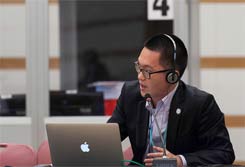
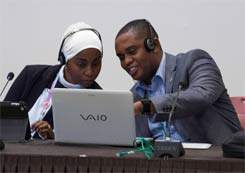
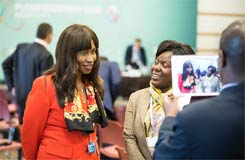
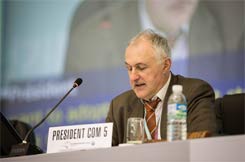
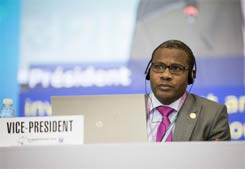
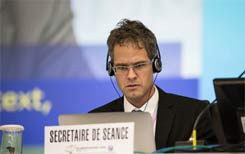
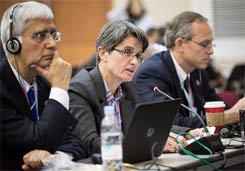
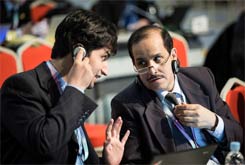
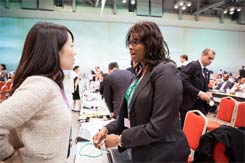
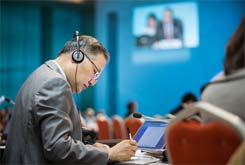
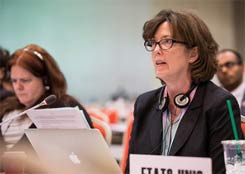
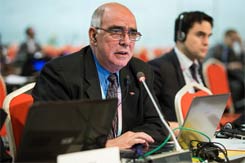
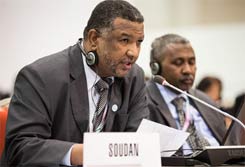
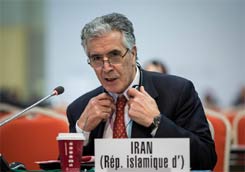
|
|
